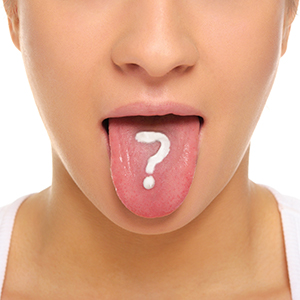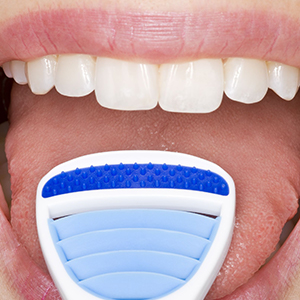
Q: I brush and floss at night, but in the morning weak up with bad breath. What else can I do?
A: Saliva production decreases during sleep, which gives odor-producing bacteria an opportunity to multiply and grow. It is considered normal to have some odor in the morning. However, if you brush your teeth in the morning and the odor returns in an hour, than you definitely need to see your dentist to check for cavities and gum disease.
In my practice we follow the following protocol: we go by eliminating of possible causes for bad odor and when necessary get in touch with patient physician to eliminate digestion or internal problems.
First, we make sure that gums and teeth are healthy. Gum disease is number one reason for bad breath. Dry mouth and reduced water intake are other big reasons for that.
Second, we often find that cleaning the tongue as part of the regular oral hygiene routines is overlooked and less than 30% of people clean their tongue on a regular base.
A Little Tongue Background
Tongue is pretty cool part of our mouth that not only helps us with things like chewing, swallowing and talking, but if not taken care of properly, the tongue alone could create some serious dental concerns. Home to over 10,000 taste buds, the tongue is often the part of the mouth that’s exposed to the most bacteria and acid. Each tiny taste bud and all those other bumps and grooves we can see and feel on the tongue’s surface make a great place for food debris, bacteria, and even fungi to hide. Bacteria feed on the leftover food that is easily trapped on your tongue’s rough surface and multiply quickly.

Reasons to scrape your tongue every day
#1 Improves the breath and oral health:
Removing the bacteria, food debris, fungi, and dead cells from the tongue significantly reduces the odor from the mouth.
#2 Improves your ability to taste:
Removing build-up from the surface of your tongue will better expose your taste buds. This will lead to better enjoyment of the flavors of your food.
#3 Improves your internal organs health:
The tongue has acupuncture points connecting to the entire body. By scraping your tongue, you are actually stimulating and massaging those corresponding internal organs, just like in acupressure or acupuncture.
How to Care of it
Every time you brush your teeth, take a few extra seconds to clean your tongue too.
You can use your toothbrush, a small metal spoon or best a tongue scraper. I found out from my patients that tongue scraper, either plastic or metal, makes it easier for those with a sensitive gag reflex. When you first start scraping your tongue, be extra gentle. Your tongue will get used to it quickly and you can go further back with time but don’t force it.
Technique: Simply stick out your tongue and place the scraper as far back on the tongue as is comfortable. Gently scrape from the back towards the front using one long stroke, until you have scraped the whole surface. You will be amazed at how much stuff comes off of your tongue. Rinse the scraper with hot water and do it again. Scrape firmly, but gently. Do this until the tongue feels clean and is free of coating.
If you are not able to scrape your tongue, gargling with salt warm water for 30-50 sec is recommended. In addition, you can add hydrogen peroxide to the water, which makes bubbles, lifts and eliminates large amount of the plaque concentrated on the tongue.
Interesting fact about the tongue
- Each human tongue is unique – just like your fingerprints.
- The average life cycle of a taste bud is 10-14 days.
- In general, women have more taste buds than men.
- Smoking destroys taste buds.


